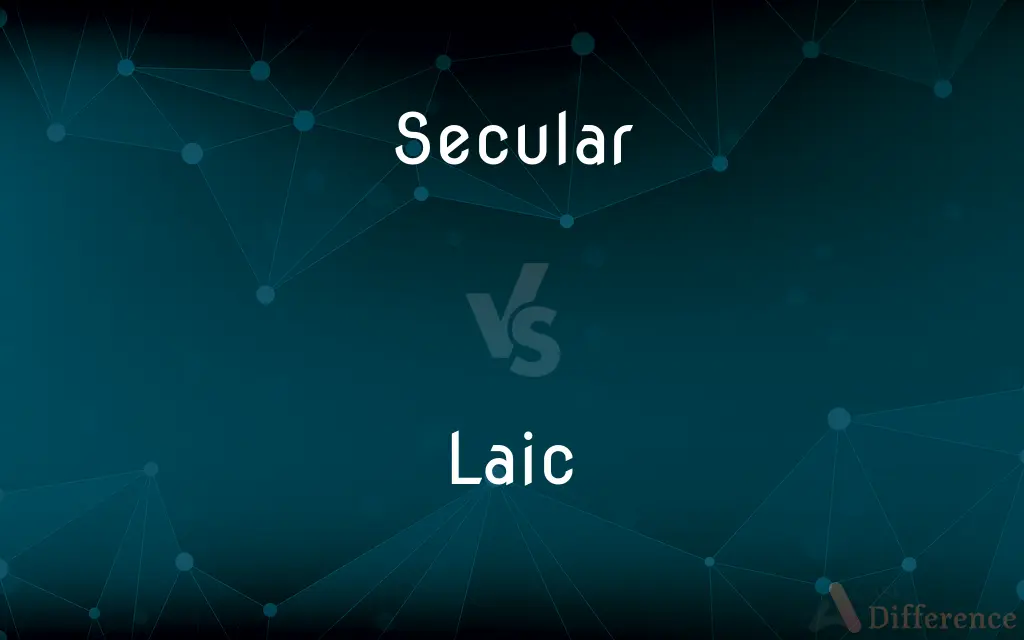Secular vs. Laic — What's the Difference?
By Tayyaba Rehman — Updated on September 27, 2023
Secular pertains to worldly matters not linked to religion, while Laic means relating to laypersons, often distinct from clergy.

Difference Between Secular and Laic
Table of Contents
ADVERTISEMENT
Key Differences
Secular refers to aspects or entities that are not influenced by religious beliefs, whereas Laic specifically denotes those individuals or matters not associated with the clergy or religious order. Both have a distinction from religious orders, but Secular has a broader context.
Secular often implies a focus on the present worldly affairs without any religious overtones. On the other hand, Laic can be applied to distinguish between common people and the clergy, emphasizing the lack of religious office or duty in the former.
Secular can describe institutions, thoughts, actions, or persons that operate independently of religious control or influence. In contrast, Laic predominantly targets the divide between the clergy and the general public, underlining a non-clerical stance.
When a country is referred to as secular, it typically means that the state doesn't favor or endorse any specific religion. When speaking of a laic individual, it simply points to someone not part of the clergy, not necessarily separated from religion altogether.
Both Secular and Laic emphasize a separation, but while Secular underscores detachment from religious undertones in many contexts, Laic primarily homes in on the division between clergy and non-clergy.
ADVERTISEMENT
Comparison Chart
Definition
Pertaining to worldly, non-religious matters.
Relating to laypersons distinct from clergy.
Typical Use
Describes institutions, actions, or ideas.
Describes individuals or their activities.
Origin
Latin "saeculum" meaning "world" or "generation".
Latin "laicus" meaning "of the people".
Contextual Application
Often used in governance and state matters.
Commonly used in religious contexts.
Scope
Broader, encompassing all non-religious aspects.
Narrower, focusing on distinction from religious clergy.
Compare with Definitions
Secular
Occurring or persisting over an indefinitely long period.
The forest has seen secular changes over the centuries.
Laic
Not having a professional or specialized character.
His understanding of the text was purely laic.
Secular
Not connected with religious or spiritual matters.
The government operates on secular principles.
Laic
Not belonging to or connected with a religious order.
The seminar was open to both clergy and laic participants.
Secular
Not bound by monastic restrictions.
He lived a secular life outside the monastery.
Laic
Secular, not ecclesiastical.
The laic influence was evident in the artwork of the period.
Secular
Worldly rather than spiritual
The secular affairs of the parish.
Laic
Typical of non-clerical people.
The priest considered the argument to be of a laic nature.
Secular
Not relating to religion or to a religious body; nonreligious
Secular music.
Laic
Of or relating to laypeople as opposed to the clergy.
The laic members of the church gathered for a meeting.
Secular
Not bound by the full monastic rule of a religious order. Used of clergy.
Laic
Of or relating to the laity; secular.
Secular
Relating to or advocating secularism.
Laic
A layperson.
Secular
Occurring or observed once in an age or century, as games in ancient Rome.
Laic
A layperson, as opposed to a member of the clergy.
Secular
Lasting or persisting for a long time
A secular bear market.
Laic
Lay, relating to laypersons, as opposed to clerical.
Secular
(Astronomy) Of or relating to characteristics of astronomical phenomena that change slowly over time.
Laic
Of or pertaining to a layman or the laity.
An unprincipled, unedified, and laic rabble.
Secular
A member of the secular clergy.
Laic
A layman.
Secular
A layperson.
Laic
Concerning those not members of the clergy;
Set his collar in laic rather than clerical position
The lay ministry
The choir sings both sacred and secular music
Secular
Not specifically religious; lay or civil, as opposed to clerical.
Secular
Temporal; worldly, or otherwise not based on something timeless.
Secular
(Christianity) Not bound by the vows of a monastic order.
Secular clergy in Catholicism
Secular
Happening once in an age or century.
The secular games of ancient Rome were held to mark the end of a saeculum and the beginning of the next.
Secular
Continuing over a long period of time, long-term.
The long-term growth in population and income accounts for most secular trends in economic phenomena.
On a secular basis
Secular
(literary) Centuries-old, ancient.
Secular
Relating to long-term non-periodic irregularities, especially in planetary motion or magnetic field.
Secular
(atomic physics) Unperturbed over time.
Secular
A secular ecclesiastic, or one not bound by monastic rules.
Secular
A church official whose functions are confined to the vocal department of the choir.
Secular
A layman, as distinguished from a clergyman.
Secular
Coming or observed once in an age or a century.
The secular year was kept but once a century.
Secular
Pertaining to an age, or the progress of ages, or to a long period of time; accomplished in a long progress of time; as, secular inequality; the secular refrigeration of the globe.
Secular
Of or pertaining to this present world, or to things not spiritual or holy; relating to temporal as distinguished from eternal interests; not immediately or primarily respecting the soul, but the body; worldly.
New foes arise,Threatening to bind our souls with secular chains.
Secular
Not regular; not bound by monastic vows or rules; not confined to a monastery, or subject to the rules of a religious community; as, a secular priest.
He tried to enforce a stricter discipline and greater regard for morals, both in the religious orders and the secular clergy.
Secular
Belonging to the laity; lay; not clerical.
I speak of folk in secular estate.
Secular
A secular ecclesiastic, or one not bound by monastic rules.
Secular
A church official whose functions are confined to the vocal department of the choir.
Secular
A layman, as distinguished from a clergyman.
Secular
Concerning those not members of the clergy;
Set his collar in laic rather than clerical position
The lay ministry
The choir sings both sacred and secular music
Secular
Not subject to or bound by religious rule.
Secular courts handle most disputes in the country.
Common Curiosities
What does Secular mean?
Secular refers to anything not connected with religious or spiritual matters.
Can a Laic person be religious?
Yes, a laic person can be religious but is not part of the clergy.
Can a country be both Secular and religious?
Yes, a country can respect religious practices but be governed by secular principles.
What does Laic mean?
Laic relates to laypersons, those not part of the clergy or a religious order.
Is Laic specific to any religion?
No, Laic is a general term and can apply to any religion to differentiate the laity from the clergy.
Is Secular against religion?
No, Secular simply means unrelated to religion, not opposing it.
Do Laic individuals have roles in religious settings?
Yes, laic individuals often have roles and responsibilities; they're just not part of the official clergy.
How does Secular relate to state matters?
A secular state operates independently of religious influence in governance and law.
Who are considered Laic in a church?
Members of a church not ordained or part of its clergy are considered laic.
Is the term Laic only used in Christianity?
No, while commonly used in Christian contexts, "Laic" can refer to laypersons in any religious tradition.
Are all Secular activities atheistic?
No, Secular activities simply operate without religious context, not necessarily opposing belief.
Is secularism a belief system?
Secularism is a principle advocating separation of religion from civic affairs, not a belief system per se.
Can a Laic individual participate in religious ceremonies?
Yes, a laic person can participate but typically doesn't lead religious ceremonies.
Can an institution be both Secular and Laic?
Yes, an institution can operate without religious influence (Secular) and without being managed by clergy (Laic).
How does Secular music differ from religious music?
Secular music addresses non-religious themes, while religious music is devoted to spiritual topics.
Share Your Discovery

Previous Comparison
Binoculars vs. Spyglass
Next Comparison
Mindless vs. ThoughtlessAuthor Spotlight
Written by
Tayyaba RehmanTayyaba Rehman is a distinguished writer, currently serving as a primary contributor to askdifference.com. As a researcher in semantics and etymology, Tayyaba's passion for the complexity of languages and their distinctions has found a perfect home on the platform. Tayyaba delves into the intricacies of language, distinguishing between commonly confused words and phrases, thereby providing clarity for readers worldwide.
















































